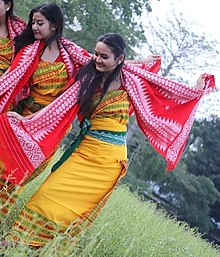
Back بودوويون Arabic بودوويون ARZ বড়ো জনগোষ্ঠী Assamese Bodo AST بودولار AZB Halak Bodo BBC বড়ো জনগোষ্ঠী Bengali/Bangla Bodos Catalan Bodo Spanish Bodo (etnia) Basque
Bara[1] | |
|---|---|
 Boro bwisagu dance in traditional attire | |
| Total population | |
| 1.45 million[2] (2011) | |
| Regions with significant populations | |
| Assam, Meghalaya | 1.41 million[3] (2011) |
| Languages | |
| Boro | |
| Religion | |
| Hinduism, Bathouism, Christianity | |
| Related ethnic groups | |
| Other Bodo–Kachari people | |
| Part of a series on the |
| Culture of Assam |
|---|
 |
The Boro (बर'/बड़ो [bɔɽo]), also called Bodo, are a Tibeto-Burman speaking ethnolinguistic group native to the state of Assam in India. They are a part of the greater Bodo-Kachari family of ethnolinguistic groups and are spread across northeastern India. They are concentrated mainly in the Bodoland Territorial Region of Assam, though Boros inhabit all other districts of Assam[7] and Meghalaya.[8]
Boros were listed under both "Boro" and "Borokachari" in The Constitution (Scheduled Tribes) Order, 1950,[9] and are continued to be called so in the Census of India documents.[10] Boros speak the Boro language, a Boro-Garo language of the Tibeto-Burman family, which is recognised as one of twenty-two Scheduled languages of India.[11] Over two-thirds of the people are bilingual, speaking Assamese as second language.[12] The Boro along with other cognate groups of Bodo-Kachari peoples are prehistoric settlers who are believed to have migrated at least 3,000 years ago.[13] Boros are mostly settled farmers, who have traditional irrigation, dong.[14]
The Boro people are recognised as a plains tribe in the Sixth Schedule of the Indian Constitution, and have special powers in the Bodoland Territorial Region, an autonomous division; and also as a minority people.[15]
- ^ By 1921 the census reported that many Kacharis had abandoned tribal names and were describing themselves as Bara by caste and language(Sharma 2011:211)
- ^ "Census report 2011" (PDF). Retrieved 5 January 2020. Note: The number are for the L1 speakers of the Boro language
- ^ "C -16 C-16 Population By Mother Tongue - Assam". census.gov.in. Retrieved 23 August 2020. Note: the number of L1 speakers of the Boro language, which is likely a lower estimate of the number of ethnic Boro people.
- ^ "639 Identifier Documentation: aho – ISO 639-3". SIL International (formerly known as the Summer Institute of Linguistics). SIL International. Retrieved 29 June 2019.
Ahom [aho]
- ^ "Population by Religious Communities". Census India – 2001. Ministry of Home Affairs, Government of India. Retrieved 1 July 2019.
Census Data Finder/C Series/Population by Religious Communities
- ^ "Population by religion community – 2011". Census of India, 2011. The Registrar General & Census Commissioner, India. Archived from the original on 25 August 2015.
2011census/C-01/DDW00C-01 MDDS.XLS
- ^ (Dikshit 2013:376)
- ^ "Meghalaya - Data Highlights: The Scheduled Tribes - Census of India 2001" (PDF). censusindia.gov.in. Retrieved 12 March 2022.
- ^ "the Constitution (Scheduled Tribes) Order, 1950" (PDF). Archived from the original (PDF) on 27 September 2022.
- ^ "ST-14: Scheduled tribe population by religious community (district level), Assam, district Sonitpur - 2011". Archived from the original on 30 January 2023.
- ^ "List of languages in the Eighth Schedule" (PDF).
- ^ (Dikshit 2013:375)
- ^ "Most scholars suggest that the first Tibeto-Burman-speaking peoples began to enter Assam at least 3,000 years ago." (DeLancey 2012:13–14)
- ^ Devi, Chandam Victoria (1 April 2018). "Participatory Management of Irrigation System in North Eastern Region of India". International Journal of Rural Management. 14 (1): 69–79. doi:10.1177/0973005218765552. ISSN 0973-0052.
- ^ "Boro (Bodo)". Minority Rights Group. 30 June 2020. Retrieved 27 November 2020.